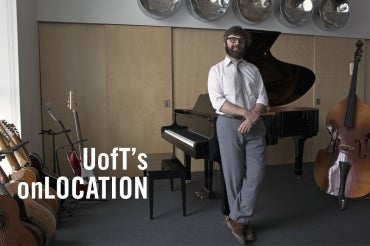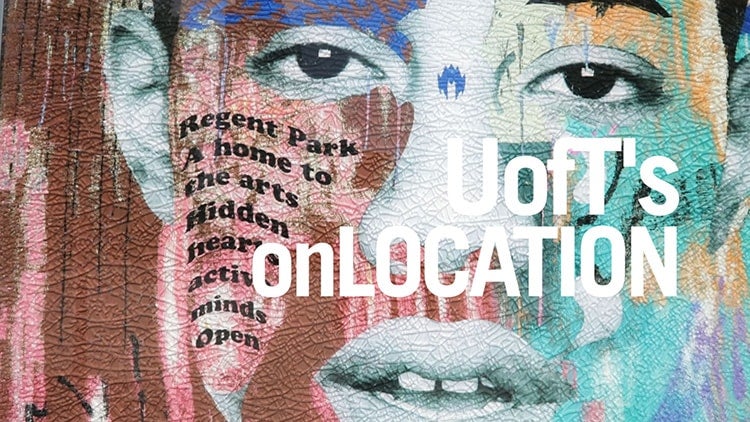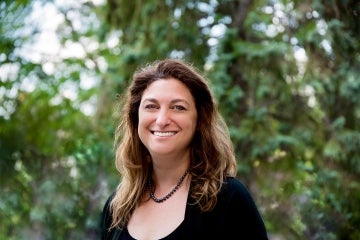U of T, Regent Park arts program harnesses the power of music to change lives of teens in detention

Published: October 5, 2017
Adam has been practising the same drum sequence for 20 minutes. Every time he misses a beat, he takes a breath, brushes it off and begins again. It’s the kind of focus and discipline that, until this point, he just hasn't had in his life.
The 18-year-old has just been released from an open custody residence run by Turning Point Youth Services – a housing facility for young men who have been involved with the youth criminal justice system.
Adam (not his real name) has been coming to the Regent Park School of Music once a week to learn how to play the drums. The lessons are part of a collaboration between the music school, members of the University of Toronto's Faculty of Music and Turning Point, which brings youth from the residences to Regent Park to learn how to play an instrument of their choice.
This program is funded by the Ministry of Children and Youth Services, the R. Howard Webster Foundation and an anonymous donor.
“Every time I come here I learn something new,” says Adam, who has just completed his first lesson since being released from open custody. “At first I used to play the drumsticks differently. They taught me the right techniques. It was hard at first, but then I got used to it.”
His passion and determination caught the eye of his music instructors, like Heather Saumer, who recognized his talent straight away.
“Right from the beginning, he had a vision for what he wanted to learn. That’s given him a real focus and direction,” says Saumer. “Those mini-accomplishments every step of the way can really build a lot of confidence and sense you're part of a larger whole.”
The music lessons are being observed by Bina John and Nasim Niknafs, assistant professors of music education at U of T, who are researching its impact on the youth.
“The project is looking at the effect of music education, not just on establishing musical identity but also on the psycho-social benefits of making music together,” says John.
These benefits have been scientifically proven, she says. “When you make music together in an instrumental or choral ensemble, it happens right from the brain where certain chemicals are released, leading to a greater understanding of your own identity and your own needs and the needs of others,” says John.
Studying the effect of music on kids in detention is a unique opportunity, she says. “Nothing like this has ever been done in Toronto or even Canada that we know of.”
Turning Point staff member Milenka Carrasco sees the impact on the young men as she watches them air drumming or jamming on a ukulele on the way back to their residence.
“Music is definitely universal to all these young men,” she says. “They all have different stories but they're able to connect with music on so many different levels.”
Programs like this one are at the core of what Regent Park School of Music (RPSM) does, says the school’s executive director Richard Marsella.
“It’s important for us to always look towards giving the kids who need us most that way into music,” says Marsella, who’s also a music education PhD candidate at U of T.
“My hope for this program is that it's changing their path. It's helping them find a voice that is meaningful and it's reconnecting them to a community that they could not have imagined prior to coming together with our faculty and our team.”
RPSM instructors have also been going to a Turning Point facility to teach students as part of the Toronto District School Board Section 23 program, which helps students outside of the traditional school system gain access to education.
“I feel like it’s just the beginning, and we’re hoping to grow to reach even more youth in the community and also bring music into youth detention centres” says Marsella.
John also sees opportunities beyond RPSM. “Our hope is to become a model for how to introduce music education into other communities other than schools,” she says.
It’s a chance to reach and have an impact on people and communities across the city, in big and small ways.
“This just reminds them they're not forgotten,” says Carrasco. “It reminds them whatever Toronto has to offer, it's for them as well.”
If Adam is anything to go by, music is already making a difference.
“It brings people together 100 per cent. It mends a lot of relationships,” he says. “I could see myself doing it for the rest of my life.”

U of T’s On Location is a new series that explores how the university is involved in shaping the urban fabric and landscape of Toronto and the GTA.


